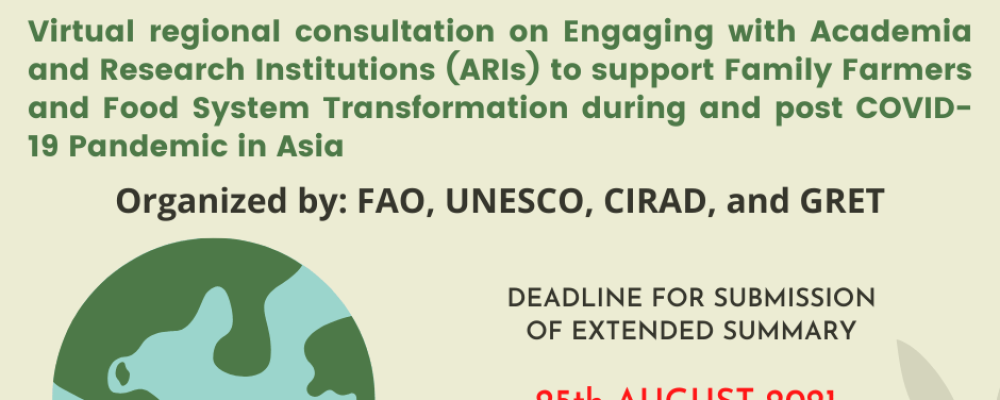Background
The food systems in the region have undergone important changes over the past decades, mostly due to rapid economic growth, increasing population and demographic shifts, rapid urbanization, rural and urban transformation, changing food consumption behavior and climate change (FAO, 2018). The effects of the COVID-19 pandemic on agriculture have been exacerbated by the way in which the current industrial farming system is set up (Altieri and Nicholls 2020), and have impacted in particular family farmers (World Bank 2020; OXFAM 2020), who represent the majority of farmers in the region1.
Agroecology as a holistic approach can contribute in addressing these challenges and can go a long way in transforming food and agriculture systems to build an inclusive, safe, sustainable and resilient society.
There are over 6000 Higher Education Institutions (HEIs) in ASEAN region alone (ASEAN Secretariat, 2014). They can provide a powerful opportunity in building a new generation of farmers, extensionists and policy makers to address the challenges faced by agrifood systems in Asia.
However, no study has adequately documented or assessed how Agroecology (including sustainable and climate resilient agriculture, community sustainability issues) is prioritized, supported, studied or applied among HEIs, and more broadly, among Academia and Research Institutions (ARIs), in the region.
Work is needed to assess critical policy, budgetary, political and curriculum reform challenges as well as gaps faced by ARIs for improving and scaling-up agroecological knowledge, policies, curricula, skills development, decent green agri-food jobs for student graduates, and field applications to ensure a Sustainable Food System.
Overall objectives of the virtual regional consultation
A virtual regional consultation will be organized towards the end of 2021. This event will aim at bringing together representatives of universities, family farmer’s organizations, agricultural research institutions, government agencies and development partners to explore how Academia and Research Institutions (ARIs) in Asia can further contribute, in particular through Agroecology, to enhancing the livelihoods of family farmers and developing their capacities to cope with increasing uncertainty caused by current shocks.
This webinar will aim to address universities’ and research institutions’ roles in: (i) promoting rural communities’ initiatives, and development and transfer of technologies; (ii) harmonization of regional policies and strategies to support family farmers; and (iii) strategies to reinforce the capacity and resilience of family farmers, especially women and youth, and their organizations to cope with shocks.
Lastly, this event is considered as the first step towards a longer-term process aiming at conducting a participatory assessment of the different ARIs in the region and the development of ad hoc projects to support better inclusion of Agroecology in curriculum and research programs.
Call for communications
Objectives and Themes
A call for communication is organized ahead of the regional event between July and September. It will contribute at framing the discussions, identifying relevant speakers, key topics and experiences. The contributions received will be reviewed and selected by an ad hoc committee (formed by the key co-organizers). There will be a possibility for selected communications to be published as an output of the consultation and as an FAO co-published document.
The communications should focus on ARIs’ experiences in supporting rural transformation, Agroecology mainstreaming and Family Farmers Organizations with the view to building back greener and more resilient (mainstreaming climate resilience and Agroecology)
The list of proposed themes (but not excluding) are:
- Agroecology and local food systems
- Agroecology curriculum & extension
- Agroecological system design (what is needed in HEIs to support the development of such innovative systems)
- Development of integrated farming systems (crop, agroforestry, livestock, aquaculture)
- Digital agriculture for sustainable and green rural transformation (in line with co-creation and sharing of Knowledge)
- Managing transboundary pests and diseases
- Agrobiodiversity / seed diversity
- Sustainability of rural livelihoods/communities
- Climate resilience and prevailing gaps in understanding of climate change impacts across the agri-food system
- Experiences related to the support of the emergence of a regional network of academics & researchers & Farmers Organizations supporting food system transformation and family farming
Requirements & Selection criteria
Length of communication: 5 pages (time new roman, 12)
Criteria for selection and presentation during the consultation:
- Relevancy with the themes
- Proven experience (success or failure)
- Initiatives from the region. Initiatives from outside the region accepted but have to be relevant to the Asian context
- Experience / initiative no older than 10 years
- English language
Steps & deadlines:
Submission of an extended summary (1-2 pages): 25th of AugustReview of the extended summary by the selection
committee: 25th August – 8th September
Submission of full paper (5 pages) for the selected extended summary: 5th of October
The selection committee will review all the extended summaries and will decide whether the communications will be presented during the regional event, published or not selected at all (if not relevant).
For selected communications, 2 options will be considered:
- A presentation of the communication during one of the thematic sessions of the regional event (and publication of the communication after the event)
- A presentation of the communications during a posters session: 2-3 min allocated to each presenter to present key findings of the communications through a poster or any other innovative approach (and publication of the communication after the event)
The selected communications are expected to be enriched by discussions during the consultation, reviewed by authors and professionally edited prior their publication in the proceedings.
Extended summaries to be sent to Ornusa Petchkul ([email protected]), Pierre Ferrand, ([email protected]), Francois Enten ([email protected]) and Estelle Bienabe ([email protected])

